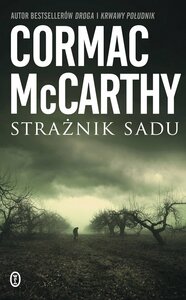You need to sign in or sign up before continuing.
Take a photo of a barcode or cover
Sorry McCarthy fans but this might be the worst book I've ever read, I just want to get to his later works lol.
Snoooooooooze. Realized half way through I didn’t know what was going on or cared
I first read Charles Portis, and True Grit, early this year. It was quite an enjoyable read. The reviewers commented that Portis and McCarthy are similar authors, but Portis is having a good time. I did not fully understand the comparison of the two authors (as the material is quite different) until I finished The Orchard Keeper. I can see one placing True Grit next to The Orchard Keeper and the book you pick is similar to one of those personality tests telling you if you are happy, depressed, etc etc etc. I have loved McCarthy’s other novels, but this one felt more fragmented (?). Perhaps this requires a revisit. It is really unlike me to leave a McCarthy novel with a shrug.
I find myself siding with some of the other reviewers who have hailed McCarthy's first novel as an imperfect foreshadowing of what was to come from him. While it carries some traces of his genius, particularly in the myriad passing descriptions of nature and its cold indifference to man, or in the sense of foreboding that seems to curl its fingers with subtle persistence into his prose, The Orchard Keeper is significantly more opaque than most of his later works. I don't disagree with others who have argued that it is unnecessarily so.
The (loose, often ambiguous) narrative follows a young boy and the two societal outcasts who come to mentor him: Marion Sylder, a prohibition-era bootlegger, and Uncle Ather, an aging hermit with a tragic and never-fully-revealed past. The two relationships evolve slowly over the course of the novel and without clear characterization, arc, or resolution, and the two mentors overlap on the periphery. An overarching theme of moral ambiguity adds to the general opacity.
I'm of two minds: on the one hand, the Tennessee landscape painted in the pages between the "story" is as vivid as any McCarthy has written since; on the other hand, it doesn't offer much more with any coherence. There are kernels of meaning and transcendent depth to be found in the characters and their interactions, but the bulk of the cognitive demands required for the reading are spent trying to decode which characters are present in a given scene and who the "he" refers to at any point.
I'm moreover torn on whether McCarthy meant for it to be this way-- as some sort of meta-depiction of the complexity, absence of meaning, and outsider uncertainty inherent in real human interactions, as if the reader were a ghost passing by and happening to overhear threads of narrative through various conversations--, or whether he was a new writer armed with beautiful prose but no experience weighing what he knows as the writer against what a reader could possibly glean from his words.
Nevertheless, it's inspiring to see his work transition from this hopeful yet lacking shred of beauty to the full-blown mastery of setting, character, language, and mood that define his later fiction.
The (loose, often ambiguous) narrative follows a young boy and the two societal outcasts who come to mentor him: Marion Sylder, a prohibition-era bootlegger, and Uncle Ather, an aging hermit with a tragic and never-fully-revealed past. The two relationships evolve slowly over the course of the novel and without clear characterization, arc, or resolution, and the two mentors overlap on the periphery. An overarching theme of moral ambiguity adds to the general opacity.
I'm of two minds: on the one hand, the Tennessee landscape painted in the pages between the "story" is as vivid as any McCarthy has written since; on the other hand, it doesn't offer much more with any coherence. There are kernels of meaning and transcendent depth to be found in the characters and their interactions, but the bulk of the cognitive demands required for the reading are spent trying to decode which characters are present in a given scene and who the "he" refers to at any point.
I'm moreover torn on whether McCarthy meant for it to be this way-- as some sort of meta-depiction of the complexity, absence of meaning, and outsider uncertainty inherent in real human interactions, as if the reader were a ghost passing by and happening to overhear threads of narrative through various conversations--, or whether he was a new writer armed with beautiful prose but no experience weighing what he knows as the writer against what a reader could possibly glean from his words.
Nevertheless, it's inspiring to see his work transition from this hopeful yet lacking shred of beauty to the full-blown mastery of setting, character, language, and mood that define his later fiction.
The prose in McCarthy's first novel is just a joy. I would consider the whole book worth reading just for the 3-page description of The Green Fly Inn's downfall. Evocative, lyrical rhythm and the scenery provides such an emotional backdrop to this story. The story itself starts off really strong, but just felt like it meandered after the first third of the book. Sort of like an early crescendo followed by a long, laconic coda. I'm not entirely sure I understood how it ended (and I'm not entirely sure it would change anything if I did).
One of my favorite passages:
"The match scratched and popped. Sylder meditated in the windshield the face of the man cast in orange and black above the spurt of flame like the downlidded face of some copper ikon, a mask, not ambiguous or inscrutable but merely discountennanced of meaning, expression. In the flickery second in which Sylder’s glance went to the road and back the man’s eyes raised to regard him in the glass, so that when Sylder looked back they faced each other over the cup of light like enemy chieftains across a council fire for just that instant before the man’s lips pursed, carplike, still holding the cigarette, and sucked away at the flame."
Is there a McCarthy world that isn't bleak?
-------------------------------
50-CENT WORDS MELANCHOLY MCCARTHY USED TO SEND ME RUNNING FOR A DICTIONARY
Mellungeons | semaphores | coombs | threnody | suppurant | guidon | murrhined | occipital | esotery | isinglass | ciborium | sporran | spodomantic | spavined | arrogating
One of my favorite passages:
"The match scratched and popped. Sylder meditated in the windshield the face of the man cast in orange and black above the spurt of flame like the downlidded face of some copper ikon, a mask, not ambiguous or inscrutable but merely discountennanced of meaning, expression. In the flickery second in which Sylder’s glance went to the road and back the man’s eyes raised to regard him in the glass, so that when Sylder looked back they faced each other over the cup of light like enemy chieftains across a council fire for just that instant before the man’s lips pursed, carplike, still holding the cigarette, and sucked away at the flame."
Is there a McCarthy world that isn't bleak?
-------------------------------
50-CENT WORDS MELANCHOLY MCCARTHY USED TO SEND ME RUNNING FOR A DICTIONARY
Mellungeons | semaphores | coombs | threnody | suppurant | guidon | murrhined | occipital | esotery | isinglass | ciborium | sporran | spodomantic | spavined | arrogating
The longest one of his works has taken me to finish. Partially due to being on vacation, but also the density of the prose. Long diversions on locations and events, but fairly light on character and plot. Definitely in his lower tier overall, but I still found the writing gorgeous and the emotions wrapped me up by the end.
challenging
dark
mysterious
slow-paced
Plot or Character Driven:
Character
Strong character development:
Complicated
Loveable characters:
No
Diverse cast of characters:
No
Flaws of characters a main focus:
Yes
The Orchard Keeper was described on the copy I read as 'a neglected classic' and while I can see how some would find this piece satisfyingly engrossing, I personally found it to be a mission completed at trudging pace, the story hard to disseminate from the lengthy prose.
My reading of this novel was a bit stilted. I started it while still on vacation in July, then got so busy when I returned to the real world that I did not pick it up again until this month. That may have had some bearing on my feelings about the book.
I enjoyed some of it, but over-all I never really cared about, nor connected, with any of the characters. I was just along for the ride. So in the end, it didn't matter what happened to any of them. This has been my least favorite McCarthy work.
I enjoyed some of it, but over-all I never really cared about, nor connected, with any of the characters. I was just along for the ride. So in the end, it didn't matter what happened to any of them. This has been my least favorite McCarthy work.
challenging
dark
sad
slow-paced






